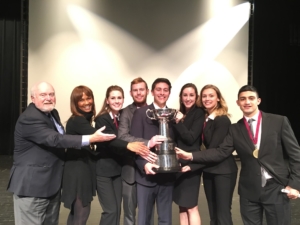A CO-MAJOR AT KELLEY
Also empowering students to go deeper is the Kelley School of Business which offers undergraduate students a co-major in social innovation.
The co-major — which consists of two required courses and three electives for a total of 15 credits — pushes students on their ability to argue the business case for sustainability, how it pays off, how to overcome barriers, the economics of change, frictions that come with change, tradeoffs, and hidden costs. “Not only do consumers want to do less harm, there’s a new wave of students who say ‘I want to do more good.’ They have a natural upward bias on the business case for sustainability so part of my job is to show them they still have to make a business case for it,” says Kreft, who created the co-major at Kelley in 2014.
“We get pretty applied with real world business cases,” he continues. One real world example, for instance, includes talking about CEO commitments to acting socially responsible. “This comes up quite often. If you don’t have it come from the top down, then workers below aren’t going to have any importance to put on that metric.”
Another application, Kreft says, was students’ analysis of Vivendi, a France-based telecommunications company that was ranked as the greenest company in the world in 2014. “All of their executives’ pay was tied to green initiatives and the ability to accomplish them, showing students that if the CEO has personal interest, you will see movement that will naturally trickle down to the other workers,” says Kreft.
The Kelley co-major is designed to complement students’ studies within one of the core majors such as marketing, finance, accounting, and management.
“All of our students in sustainable business have to take it with another core major,” Kreft explains. “The signal we’re trying to send students is that you can’t graduate with just this and be impactful, but you have to understand or master a core skill with sustainable business overlaid.”
Examples on how this is translated into the curriculum, he says, are things like finance students taking courses in impact investing, marketing students taking courses on green brands and marketing for sustainable businesses, or operations students learning about lean supply chains within sustainable businesses.
“What this signals to employers is, ‘Not only do I have my core major, but I also have this great and valuable perspective on sustainability that I can bring to your organization,’” Kreft tells Poets&Quants.
FORDHAM’S HOLISTIC APPROACH
At Fordham’s Gabelli School of Business, social impact takes a more broad approach. “Everything begins with the school’s recently updated mission statement,” Aksoy says. The statement vows to educate compassionate business leaders who will change the business world in a positive way.
“The idea of social innovation is embedded in our mission of the business school, it’s not just one theme that occurs or classes that we offer,” says Aksoy. “It’s at the core of who we are as a business school.”
She says Gabelli’s approach is really two-fold: “For us, social innovation is mindset and capability. That’s what we’re trying to do. We give students a social innovation lens to look through, but also capabilities to make that change or that impact and have a career full of purpose.”
To achieve this, Fordham puts social innovation in front of students from the time they walk through the door as freshmen. During the “Ground Floor” Intro to Business course, an entire session is devoted to social innovation, what it is, and why it’s important. There is also a business plan assignment that’s worked on during the very first year. The business plan pertains to a developing a new business — a product or a service — that offers a solution to one of the 17 Sustainable Development Goals put forth by the United Nations.
During sophomore year, students are divided into social innovation cohorts wherein they are assigned a company then tasked with identifying a social impact opportunity or challenge facing the organization. The culmination is a presentation from all of the cohorts and a chance to win the coveted consulting cup challenge.
Finally, new concentrations around social innovation were recently created so that students can opt to take deeper dives into social innovation during their junior and senior years.
All of these initiatives at Gabelli are supplemented by co-curricular social innovation opportunities offered by the school’s Social Innovation Collaboratory. This is an internal center that gives students extra-curricular chances to feed and cultivate their passions for social impact.
“The bottom line is we try to create awareness across the board so everyone has a baseline level of social innovation and what it means in business,” Aksoy says. “Those who want to be engaged more and dig deeper, there are different opportunities to customize their education based on their interests and areas they want to pursue as their career. All they need to do is find pathways we’ve provided and go after them.”
INTERESTED IN SOCIAL IMPACT? LOOK FOR THE ASHOKA U ‘CHANGEMAKER CAMPUS’ BADGE
In instances where social impact and social innovation are present within business schools, it is almost always matched with the theme of being interdisciplinary. Reason being, schools say, is because the sustainable goals that social innovation goes after are too wide and too complex for just the business sector to solve.
“Sustainability isn’t something that lives in one section of business, it cuts across all disciplines,” says Kelley’s Kreft. “Our co-major definitely stretches the scope of the business school more into the liberal arts and social sciences side of business. We’re not teaching them a practical skill at this point, but they’re questioning what’s going on in the world and how it impacts businesses.”
Another signifier, if you will, of a school’s depth into social innovation is its association with Ashoka U, an organization founded in 2008 that works with higher ed institutions to instill a campus-wide culture of social innovation. Top business schools whose campuses have been designated an Ashoka U “Changemaker Campus” include Cornell University, Babson College, and Northeastern University. As a leading designation for social innovation on college campuses, many B-schools consider this a gold standard of designations.
OUTCOMES AND OPPORTUNITIES
As was previously alluded to, it appears that the business world is playing some catch-up when it comes to real world business practice of social innovation.
This means the job descriptions that students are dreaming of have yet to be written. “What they really want to see is that they can graduate and step into a role directing social responsibility for a company, directing a corporation to make more responsible decisions for communities, or leading an initiative where they’re able to grow volunteerism within an organization,” says Asbury at the Kelley Institute for Social Impact.
Since those roles haven’t been created yet, Asbury advises students to look to the mission statement. “What I tell them is to skip the CSR or sustainability webpage on a company’s website and look at the mission statement,” she says. “If you see it reflected there, you’re more likely to feel more connected to that company based on your values.”
Still, Asbury does point out there are some companies that are further along than others and making a phenomenal social impact. Such companies include Deloitte which is well known for its employee participation in volunteerism and service trips both in the U.S. and around the world as well as Eli Lilly, also known for service excursions and giving back.
DON’T MISS: AT STERN, SUSTAINABILITY ISN’T JUST A BUZZWORD and B-SCHOOLS WITH THE BEST COLLEGE EXPERIENCE













Questions about this article? Email us or leave a comment below.